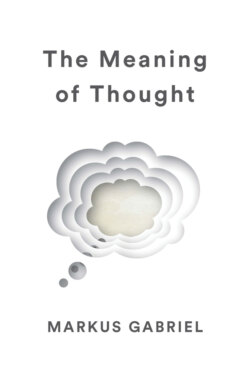Читать книгу The Meaning of Thought - Markus Gabriel - Страница 7
ОглавлениеAcknowledgements
This book was made possible through the support of a number of people and institutions, to all of which I owe a debt of gratitude. First and foremost, I would like to thank the Alexander von Humboldt Stiftung and the Université Paris 1 Panthéon-Sorbonne. I completed the manuscript while I was guest professor at the Sorbonne, which was enabled by a Feodor Lynen fellowship for experienced researchers. The research project that led to The Meaning of Thought is concerned with fictional objects – that is, with the question of the extent to which those objects that we imagine and tell stories about really exist. Answering this question means further elaborating the framework of New Realism, in which, as I’ve made clear elsewhere, fictional objects are quite welcome, just like unicorns. I would also like to thank my own university, the University of Bonn, for granting me a generous period of leave so that I could take up the research grant in Paris.
In this connection, thanks are due to the CNRS, to the president of the University of Paris 1, Professor Georges Haddad, and to the rector of the University of Bonn, Prof. Dr. Dr. h.c. Michael Hoch for their support in founding a new research centre on New Realism (Centre de Recherches sur les Nouveaux Réalismes, CRNR), funded by the CNRS and partner universities. A key focus of this centre is the prospects for a realist philosophy of perception, a topic I have had the pleasure of being able to pursue with the philosophers Jocelyn Benoist and Quentin Meillassoux. Considerable thanks are due to Jocelyn Benoist in particular, to whom I owe the inspiration for trying to overcome the subject–object split already at the level of perception, so as to arrive at a realist understanding of the sensible. Benoist’s own recent work constitutes one of the most important contributions to this goal.
I would also like to thank the senate of the Republic of Chile for the invitation to their Congresso Futuro. It was at this event that I had the opportunity to get to know Giulio Tononi, whose non-reductionist, realist theory of consciousness gets us beyond the subject–object dichotomy on the terrain of neuroscientific research. Unfortunately, I had completed the manuscript of the book before I was able to visit Tononi’s lab in Madison, Wisconsin, in May 2018, which meant that the fruits of our conversations did not find their way into the book.
Thanks are also due to my colleagues at the Center for Science and Thought (CST) at the University of Bonn and at the International Center for Philosophy NRW for many days of conversation about the topics of the book. Ulf-G. Meissner, Michael N. Forster and Jens Rometsch deserve particular mention: for many months, I have had the pleasure of discussing with them which form should be taken by a realist theory of perception and thought. In addition, I had the opportunity to run an immensely stimulating seminar in Bonn together with Jocelyn Benoist and Charles Travis on the manuscript of Charles’s new work on Frege, in which he defends the existence of an ‘invisible realm’ against the error of a linguistic reading of the reality of thought. One day, I might reveal to Charles that behind Frege stands the good old project of an ‘invisible church’,1 which is called German idealism.
I would also like to express my gratitude to the team working at my chair: Walid Faizzada, Marin Geier, Mariya Halvadzhieva, Jens Pier, Jens Rometsch and Jan Voosholz, for their comments on an earlier version of the book and for their help in putting together and preparing the final manuscript.
Notes
1 1. Georg Wilhelm Friedrich Hegel, ‘Hegel an Schelling [End of January 1795]’, in Johannes Hoffmeister (ed.), Briefe von und an Hegel (Hamburg: Meiner, 1969), pp. 15–18, here p. 18.
